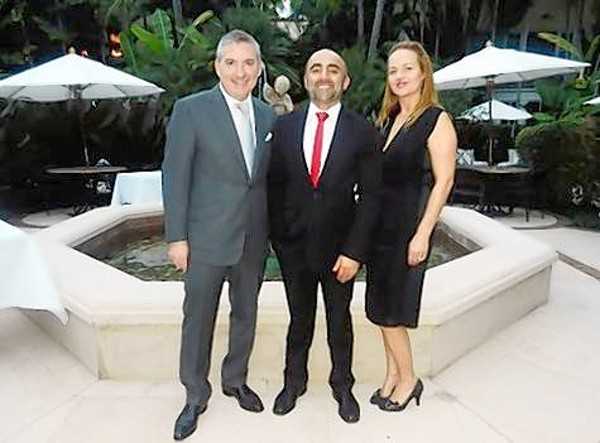
From left, Anthony Beyer, Dr. Soner Cagaptay and Vanessa Beyer at The Washington Institute for Near East Policy briefing in Palm Beach. (Submitted photo / February 20, 2013)
By Shani McManus, Staff Writer
2:26 p.m. EST, February 20, 2013
The strategic position of Turkey, its relationship with Israel, the United States, and its neighbors, was the topic of conversation when The Washington Institute for Near East Policy Beyer Family Fellow, Dr. Soner Cagaptay, addressed organization leadership at a recent briefing in Palm Beach.
Cagaptay, a respected source of analysis on Turkey’s foreign policy and relations with the United States, also touched on the growing tensions with Syria regarding sectarian spillover and cross-border shelling. In an interview with the Jewish Journal, he talked about the tenuous relationship between Israel and Turkey.
“I think that the relationship is at a crucial point,” Cagaptay said. “Both countries want to repair ties, but if ties are not repaired in the short-term, the unfriendly nature of the relationship will persist, and the relationship could enter a chronically downward spiral.”
A prolific author who has written extensively on U.S.-Turkish relations, Turkish domestic politics and Turkish nationalism and frequent commentator in the media, Cagaptay said the new Turkey is “a blend of old Turkey,” when the Turks considered their country to be European, “and the AKP’s vision,” which sees the country as Middle Eastern.
“Israel’s challenge is to understand that the old Turkey is not coming back and decide on the kind of relationship it wants with the new Turkey,” he said. “The new Turkey desires to become a Middle East power, but Ankara cannot become a Middle East power unless it can talk to all sides in the region, that includes the Israelis.”
Looking at the future, Cagaptay noted, this suggests that when Turkish-Israeli ties are restored, they will “not look like the bilateral ties of the 1990s,” when the relationship was shaped by affinity and agreement at almost all levels.
“Rather, the future relationship will likely be defined by overlapping security interest, such as in Syria, but also disagreements, such as on Hamas,” he said.
The well-attended briefing event at Palm Beach’s Cafe Boloud was hosted by Vanessa and Anthony Beyer, who are involved in numerous civic and charitable causes, including the Norton Museum of Art and the Israel Museum. The Palm Beach businessman and philanthropist and his wife established the Washington Institute’s Beyer Family fellowship to support the organization’s work in the study of contemporary Turkish politics and Turkey-U.S. relations.
“Turkey’s importance as a regional power and NATO member has only increased in light of the changes sweeping across the Middle East,” Anthony Beyer said. “It is our hope that this fellowship enables Dr. Cagaptay to expand the well-respected analysis that has made him a trusted resource for governments, academia and the media.”
Beyer said many people who attended the briefing were “very informed” about what’s been happening in Turkey. “The fact that a once-secular society has gone to an Islamist-secular one has people very concerned,” he said.
A third-generation member of the Washington Institute, Beyer noted that he’s “not been able to find another organization that has been able to have such an impact on policy makers to promote a sound peace policy in the Middle East.
For more information about The Washington Institute, call Jeanne Epstein at 561-328-9033 or visit
Copyright © 2013, South Florida Sun-Sentinel
via Talking Turkey – South Florida Sun-Sentinel.com.

Leave a Reply